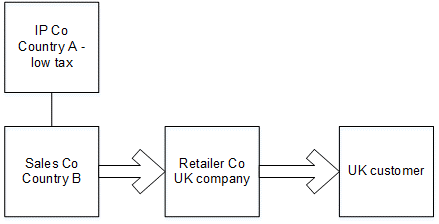15 October 2019
We’re now well into the new taxation of offshore intangible property receipts, which came into play with the Finance Act 2019. Intangible property (IP) has a very wide meaning but will include patents, trademarks and copyright.
It has been common international tax planning for many years to place intellectual property into an offshore tax haven, so that no or little tax would arise on the payment of royalty or license income in relation to this property.
Typically, the intangible asset would be transferred or created in that low tax country and then a royalty or licence fee would become payable by a taxpayer, situated in a high tax economy in the same tax group, for the use of that IP. The payment would then give tax relief in the high tax economy and the receipt would have no or little tax in the low tax country.
The New Rules
The Finance Act 2019 states that, from April 2019, where such a low tax country has income or capital arising in respect of its intangible property, which relates either directly or indirectly to goods or services sold in the UK, then that income will become taxable in the UK. It applies to all UK-derived amounts received by the overseas entity arising after 5 April 2019 and it does not matter which entity has actually sold the goods or services.
The rules are subject to further amendment by HMRC regulation.
Any such amounts will be taxed under UK income tax at the basic rate of 20%. This is applied to the ultimate UK sales as a proportion of the gross income of the overseas company. These rules apply whether or not the group has a UK company or permanent establishment. The tax will be due from either the overseas company or any other related party.
This is undoubtedly going to add to the administrative burden of UK companies who have complex arrangements, in particular where there are numerous overall movements of goods or services through several value-added transactions in many countries. The UK connection then needs to be traced back where there is ultimately a sale to a UK customer.

Exemptions
Not all arrangements will be caught within the scope of the new rules. Specific exemptions apply to:
- Where the IP company has a full tax treaty with the UK. This will generally exclude any tax haven, where there is either no treaty or a limited benefits treaty (i.e. one without a ‘non-discrimination’ clause). There is an ability to add to the exempted territory list by HMRC.
- Goods for onward distribution or resale will not be considered to be UK sales.
- If there is a possible ‘multiple tax’ in complex chains, provisions are being introduced to ensure goods are only taxed once.
- Where the intangible asset makes an insignificant contribution to the eventual UK sale then it can be excluded.
- Where UK sales are less than £10 million (including any sales to the connected parties).
- Where the income is taxed by at least 50% of the UK tax charge that would otherwise have arisen.
- Where IP has not been acquired from related parties and where substantially all of the trading activities have always been in that country, i.e. the IP has been created, developed and continuously maintained in that same offshore territory.
Anti-Avoidance
Where groups attempt to circumvent these rules by transferring to another tax jurisdiction with a full treaty, (and where it is demonstrated that this was one of the main reasons for doing so) then the charge will still apply.
How UHY Can Help
Cross border tax considerations have become yet more complex with this new tax. Clients using offshore jurisdictions need to be aware not only of how these rules might apply, but also all other issues regarding use of non-resident companies such as company residence rules, permanent establishments, transfer pricing and economic substance rules to name but a few.
If you haven’t ‘health checked’ your overseas business for some time then it is recommended you speak to your local UHY partner to guide you through and consider your situation.


